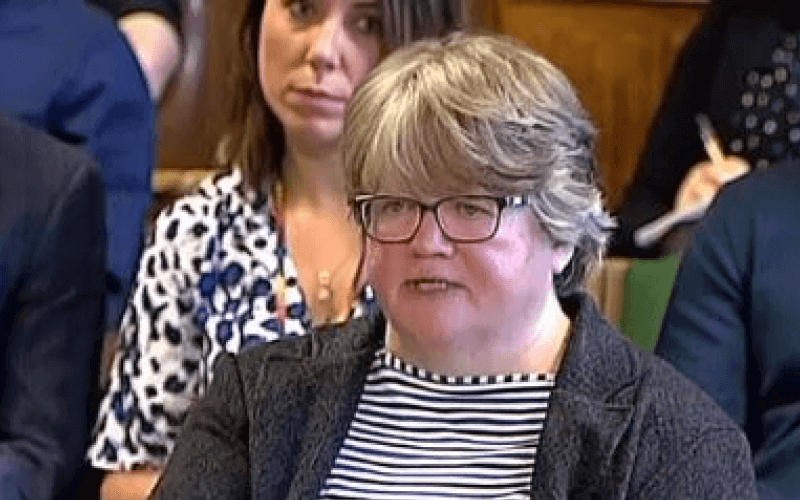Work and pensions secretary Therese Coffey has rejected calls from her own social security advisers to give claimants of employment and support allowance (ESA) the same £1,000 increase in their annual allowance given to those receiving universal credit.
The increase, which will last a year and also applies to those receiving working tax credit, was part of the government’s response to the coronavirus pandemic, and was announced on 20 March.
But Coffey (pictured) has refused to extend the temporary increase to claimants of ESA, or to those on jobseeker’s allowance (JSA) or income support.
The social security advisory committee (SSAC) called on 27 May for the increase to be extended, saying that, despite the “serious IT challenges”, it was “increasingly untenable for this group of claimants to be excluded and to continue to have a lower level of income than those in receipt of Universal Credit and Working Tax Credit”.
Now, two months later, Coffey has responded to the SSAC letter, and has refused to extend the increase.
She suggested that doing so would put at risk the “safety and the stability of the benefit system” and said she had “no plans to increase Employment and Support Allowance, Jobseeker’s Allowance or Income Support”.
Among those who have criticised the failure to act is Disability Rights UK, which wrote to the minister for disabled people last month to say that the refusal to match the £20-a-week rise “discriminates against the millions of disabled people on other benefits who have not received the same increase”.
The government has released a list of people who are exempt from new rules that cover the wearing of face coverings in shops, supermarkets, shopping centres and transport hubs.
The list was released as the rules came into force last Friday (24 July), along with a link to messages explaining that someone is exempt from the new rules, which can be printed or downloaded and used as a badge or card or shown on a mobile phone.
The exemptions are the same as those which already applied to the wearing of face coverings on public transport.
Justin Tomlinson, the minister for disabled people, said: “The new regulations are an important step forward in our efforts to defeat coronavirus but I would urge the public and businesses to be mindful of people who are exempt from wearing a face covering – particularly those with disabilities and health conditions.
“Some disabilities are hidden and not immediately obvious and everyone must play their part and act sensitively towards people who may need additional support.”
The British Film Institute’s disability advisory board has helped launch a new project to persuade the screen industry to improve how it engages with disabled talent behind and in front of the camera.
Press Reset wants to see the industry (R)ecruit responsibly; (E)ngage with the disability community; (S)et employment targets for disabled talent; ensure (E)qual pay; and (T)hink about access.
Among those on the disability advisory board are disabled actors Sam Renke, Melissa Johns and Cherylee Houston, actor and presenter Adam Pearson, actor, writer and producer Kim Tserkezie, and Andrew Miller, the government’s disability champion for arts and culture.
Miller said: “Before this pandemic, representation of disabled people was wholly inadequate in our industry, but solid progress towards equality was being made.
“We mustn’t allow the pandemic to risk disabled people becoming invisible in our media once again. It’s time to Press Reset.”
Britain’s rail companies announced this week that all of them now recognise the Hidden Disabilities Sunflower scheme, which provides lanyards and cards that disabled people can wear or show to let others know they have an invisible impairment.
All train operators and Network Rail said they were now signed up to the scheme, which allows disabled passengers to show others that they might need more time or support.
Staff are now being trained to recognise the sunflower symbol when it is worn as a lanyard or shown as a card.
Disabled writer and blogger Chloe Tear, who uses the lanyard, said: “I believe the sunflower lanyard is a great initiative that gives disabled people control around discussing their condition.
“The subtle symbol means we won’t have to continuously explain and often justify our needs if they are invisible to others.
“Despite having a physical disability and being partially sighted, if my cane is folded up and I’m sat down it wouldn’t be hard to mistake me for a non-disabled young woman.
“The fear around not receiving support or being judged for using priority seats is eased by the sunflower lanyard and card.”
A note from the editor:
Please consider making a voluntary financial contribution to support the work of DNS and allow it to continue producing independent, carefully-researched news stories that focus on the lives and rights of disabled people and their user-led organisations.
Please do not contribute if you cannot afford to do so, and please note that DNS is not a charity. It is run and owned by disabled journalist John Pring and has been from its launch in April 2009.
Thank you for anything you can do to support the work of DNS…

 ‘Dangerous’ rollout of universal credit ‘poses threat’ to disabled claimants
‘Dangerous’ rollout of universal credit ‘poses threat’ to disabled claimants Tory MP brands plan to scrap WCA and allow work coaches to decide fitness for work ‘a crazy idea’
Tory MP brands plan to scrap WCA and allow work coaches to decide fitness for work ‘a crazy idea’ Spring tour for austerity installation on DWP deaths that was inspired by war photographers
Spring tour for austerity installation on DWP deaths that was inspired by war photographers